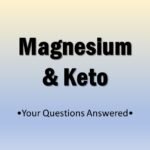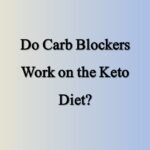Zinc is in finite supply in the body, but do you need to take zinc supplements on keto? Supplements are an option, but we will take you through other options which are available to you.
Why May You Need Supplements when Eating a Keto Diet?
If you’re new to keto and want a bit more information, check out our keto beginners guide.
As a quick summary, if you need it, the keto (also known as the ketogenic diet) is a low-carb, high-fat diet (LCHF).
The whole concept of the keto diet is that your body transitions from burning glucose, in simple terms, sugars or carbohydrates, to burning fat as its primary fuel source.
For a keto diet, people will restrict their macros to eating;
- 70% of their calories are from fat
- 25% from protein
- 5% from carbohydrates
Sticking to these macros for a period of time will put your body into a state of ketosis. Ketosis is when your body has transitioned from burning carbohydrates as its primary fuel source to burning fat for fuel. It is at this point that you will start to see and feel the benefits of the keto diet.
It is the role of the liver to convert amino acids into small amounts of glucose. This process is called glucogenesis. This is when ketone bodies (ketones) are created.
Eventually, your body will become what is known as ‘fat adapted‘. In simple terms, this means that your body is accustomed to burning fat as its primary fuel source and it will function this way as its default setting.
There are a lot of new terms and abbreviations that you may come across, sometimes it can feel like a new language that you need to learn. In order to help you out and keep you on the right track, we have created a keto terms and keto abbreviations guide, bookmark these to make your keto journey easier.
Some people can be put off the keto diet because of the side effects, however, these are only short-lived and the health benefits of keto far outweigh the side effects.
There is no doubt that the process of getting into ketosis and remaining there is a massive change to the way your body is used to functioning.
Supplements may be able to assist your body with this transition and speed up your journey to your health and keto goals.
What Does Zinc Do for the Body?
Zinc is a non-renewable nutrient. This means the body cannot produce or store it.
Therefore, people must ensure a steady supply of your food. Zinc is the second most abundant trace mineral in the body, after iron.
It is found in every cell and is vital for skin health, DNA synthesis, aa well as the creation of proteins.
What Will Happen if I Have Too Little Zinc?
Zinc assists in the body’s battle against infections and the production of new cells.
Your body uses zinc for cell formation and immunological function. It’s necessary for wound healing and the production of DNA, which serves as the genetic blueprint for all of your cells.
Although there is still much to discover about zinc, we know that it is necessary for growth.
If you’re pregnant and have a zinc deficiency, your baby may not get the nutrients they need to develop normally in your womb. If you feel this may be you, please seek medical advice.
Zinc deficiency might also make it difficult to get pregnant if you and your spouse are trying.
Low Zinc symptoms on Keto
You may experience adverse effects if you don’t receive enough zinc in your diet, such as:
- Hair thinning
- Lack of attentiveness
- Decreased olfactory and gustatory senses
- Unexplained losing weight
- Wounds that fail to heal
- Diarrhea
- A decrease in appetite
- Skin sores that haven’t healed
Why Do You Need Zinc on the Keto Diet?
Many people criticized keto due to the limitation of carbs, exposing you to risk for vitamin deficiencies.
You want to ensure you’re getting all of the vitamins and minerals you need if you’re changing your diet or adopting a new eating strategy.
Benefits of Taking Zinc
Zinc provides several health benefits
Healthy Immune System
Taking zinc supplements improves the function of certain immune cells. It also reduces the possibility of oxidative damage.
Eating 80–92 mg of zinc per day can lower the severity of a cold by up to 33%.
It can accelerate the healing of wounds
Taking zinc supplements can help people recover faster from wounds and minimize the extent of diabetic foot ulcers.
Zinc is necessary for healthy healing since it aids collagen formation and immunological function. The zinc content of your skin is relatively high — roughly 5% of your total body zinc concentration.
May Help to Lower the Risk of Age-Related Diseases
Zinc supplementation stimulates influenza vaccination efficacy, cuts pneumonia risk, and boosts mental ability in the elderly.
Taking 45 mg of elemental Zinc per day can reduce the risk of infection in older persons by about 66%.
Daily antioxidant supplements and 80 mg of Zinc dramatically reduced vision loss and the likelihood of progressive AMD.
Acne Treatment Possibilities
Zinc therapies effectively treat acne by reducing inflammation, inhibiting P. acnes bacterium development, and regulating oil gland functioning.
Acne sufferers have reduced zinc levels. Consuming zinc may assist in alleviating symptoms.
Inflammation Reduction.
Zinc decreases oxidative stress, contributing to heart disease, cancer, and mental deterioration, among other chronic ailments.
How much Zinc Should I Take on Keto?
Zinc intake for adults is 8 milligrams (mg) for women and 11 milligrams (mg) for men.
What Kind of Zinc is Best for the Keto Diet?
Chelated Zinc is the ideal kind of zinc because the body easily absorbs it.
Chelating Zinc is a chemical compound that forms a stable, water-soluble product easily absorbed by the body by bonding with metal ions such as zinc.
So, to make the ketogenic diet a well-balanced diet, you’ll need to complement it with nutritional supplements, as advised by qualified doctors and dieticians.
What Will Happen if I Have Too Much Zinc?
Zinc overdose can be abrupt, with short-term side effects, or chronic, with long-term consequences. Immediate overdose symptoms can appear soon after ingesting a high quantity of Zinc and include:
- Nausea
- Vomiting
- Stomachache
- Diarrhea
- Headaches
- Immune system dysfunction
- Lack of copper
How To Get Zinc On Keto?
Zinc is obtained from various foods, such as meat if you consume the recommended amount each time you eat.
However, if you do not take the minimum amount of zinc and are suffering from zinc deficiencies, you should consult a physician who can recommend alternative zinc supplements.
Keto sources of zinc include;
- oysters
- beef
- seafood
- poultry
are some keto foods you find zinc in.
Check out this article for more on vitamins and supplements on the keto diet – learn which ones you need and which you do not.
How Much Zinc is in Your Food?
Assess the quantity of zinc you consume daily.
Ask yourself: Is this the recommended intake? If you have a zinc deficiency, incorporate the suggested keto-friendly food items high in zinc into your diet, or look for zinc supplements at your local pharmacy or drugstore.
In order to track your vitamin and mineral intake using a tracking app such as MyFitnessPal.





